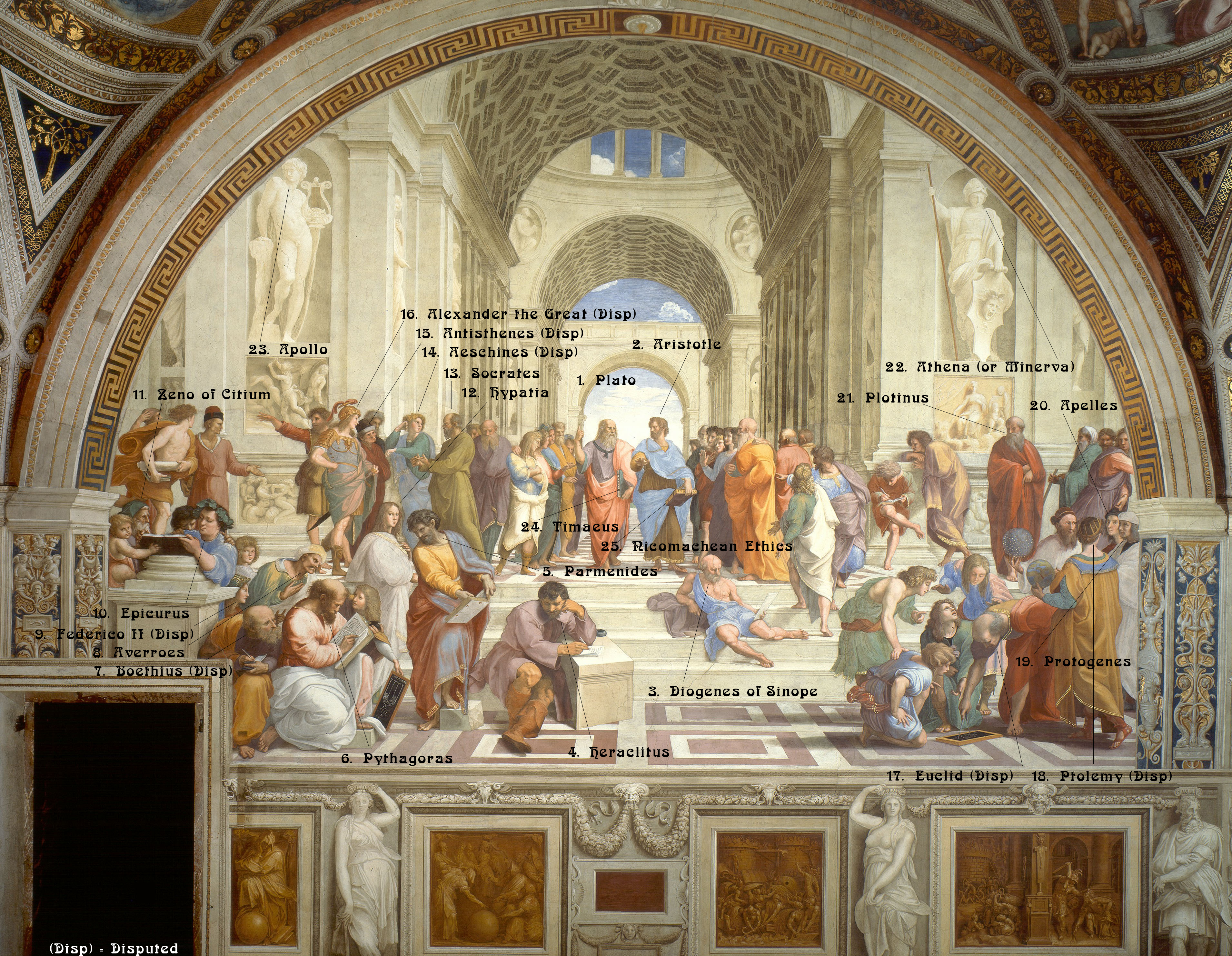There are total of 58 human figures, 2 main sculptures and 2 books in the painting. Though, out of them only 21 figures are totally or partially identified. Both sculptures and books are recognized correctly.
Moreover, the artist Raphael has painted the ancient geniuses in form of his contemporary artists who were considered the greatest minds of renaissance time. The names written in bracket are those contemporary artists.
Here is a list of all the recognized figures in the painting:
- Plato (Leonardo da Vinci) : Greek philosopher, mathematician, Student of Socrates, founder of Academy in Athens during 424/423 BC – 348/347 BC
- Aristotle (Giuliano da Sangallo) : Greek philosopher, Student of Plato, Scientist, Thinker, Teacher of Alexander the Great, Writer of Nicomachean Ethics during 384-322 BCE
- Diogenes of Sinope: Greek philosopher, one of the founder of Cynic philosophy during 412 or 404 – 323 BCE
- Heraclitus (Michelangelo): Greek philosopher, believer of Unity of Opposites, called as “Weeping philosopher” due to his melancholia during 535 – 475 BCE
- Parmenides maybe (Leonardo da Vinci): Ancient Greek philosopher, founder of Eleastic school of philosophy during 5th century BCE
- Pythagoras: Greek philosopher, mathematician, founder of Pythagoreanism, Scientist, Mystic, known for Pythagorean theorem, student of Anaximander during 570 BC – 495 BC
- Boethius: Roman philosopher, writer of “The Consolation of Philosophy” during 480–524 OR Anaximander: Greek Philosopher, Scientist, Teacher of Pythagoras and Anaximenes during 610 – 546 BC OR Empedocles: Greek Philosopher, Originator of Cosmogenic theory during 490 – 430 BC
- Averroes: Andalusian Muslim polymath, Philosopher, Theologian during April 14, 1126 – December 10, 1198
- Unknown (Federico II of Mantua or Raphael)
- Epicurus: Greek philosopher, founder of the school of philosophy called Epicureanism during 341–270 BC
- Zeno of Citium: Greek Thinker, founder of Stoic school of philosophy, Teacher in Athens during 334 – 262 BC
- Hypatia: Greek Neo-Platonist philosopher, head of Platonist school of Alexandria during AD 350/370 – 415 OR Raphael: Italian painter, architect during April 6 or March 28, 1483 – April 6, 1520 OR Fornarina: Raphael’s mistress OR Francesco Maria della Rovere: Duke of Urbino, Italian Condottieri during 22 March 1490 – 20 October 1538
- Socrates: Classical Greek philosopher, one of the founders of Greek philosophy, Teacher of Plato and Xenophon during 470/469 BC – 399 BC
- Aeschines: Follower of Socrates, writer of 7 Socratic dialogues OR Xenophon: Greek historian, soldier, mercenary, Student of Socrates during 430 – 354 BC
- Antisthenes: Greek Philosopher, Student of Socrates, Founder of Cynic Philosophy during 445 – 365 BCE OR Xenophon: written above OR Timon: known for his misanthropy, inspiration for William Shakespeare’s Timon of Athens during 431 BC–404 BC
- Alexander the Great: King of Macedon, Creator of one of the largest Empires of the ancient world during 20/21 July 356 – 10/11 June 323 BC OR Alcibiades: Athenian statesman, Orator, General, Military Commander, Politician during 450 – 404 BC
- Euclid: Greek mathematician, called as “Father of Geometry”, writer of “Elements” during 323–283 BC OR Archimedes (Bramante maybe): Greek mathematician, Physicist, Engineer, Inventor, Astronomer, Scientist during 287 BC – 212 BC
- Ptolemy maybe: Greco-Roman writer of Alexandria, mathematician, astronomer, geographer, astrologer, poet during AD 90 – AD 168
- Protogenes (II Sodoma, Perugino or Timoteo Viti): Greek painter, rival of Apelles during 4th century BC
- Apelles (Raphael): Greek painter, portrayed Alexander the Great during 4th century BC
- Plotinus (Donatello maybe): Ancient philosopher, writer of Metaphysical subjects during 204/5 – 270
- Athena: Greek goddess of wisdom, courage, inspiration, civilization, law and justice, just warfare, mathematics, strength, strategy, the arts, crafts, and skill
- Apollo: Greek god of light and sun, truth and prophecy, healing, plague, music, poetry
- Timaeus: Plato’s dialogues (written form of conversations) written during 360 BC
- Nicomachean Ethics: Aristotle’s works on ethics
- Strabo: Greek geographer, philosopher, historian, writer of “Geographia” during 64/63 BC – AD 24 OR Zoroaster (Baldassare Castiglione): founder of Zoroastrianism, philosopher.

